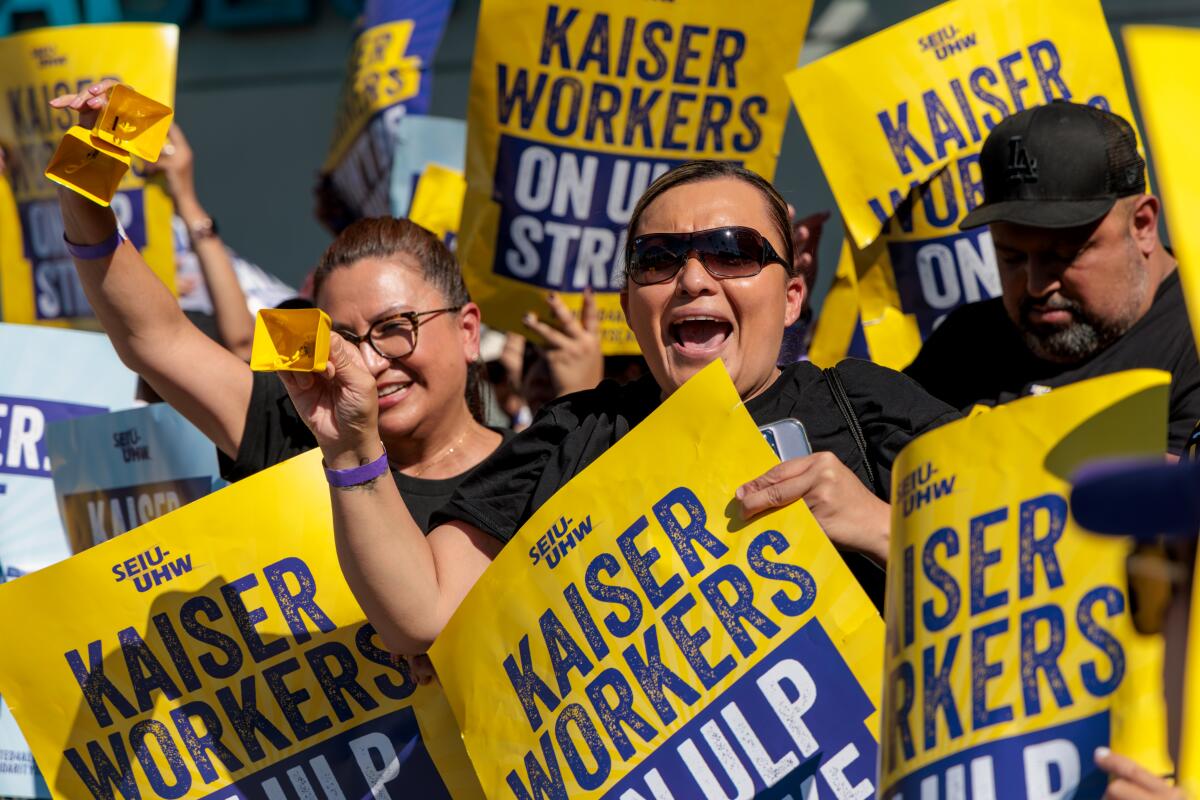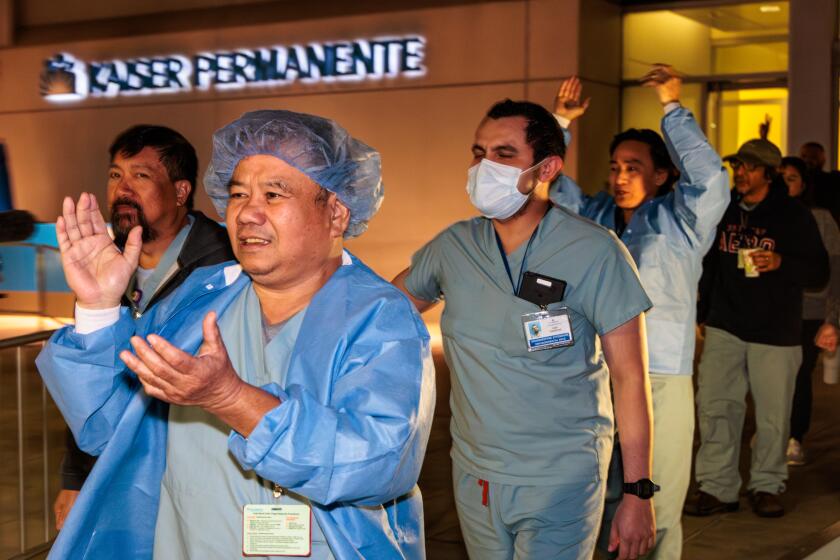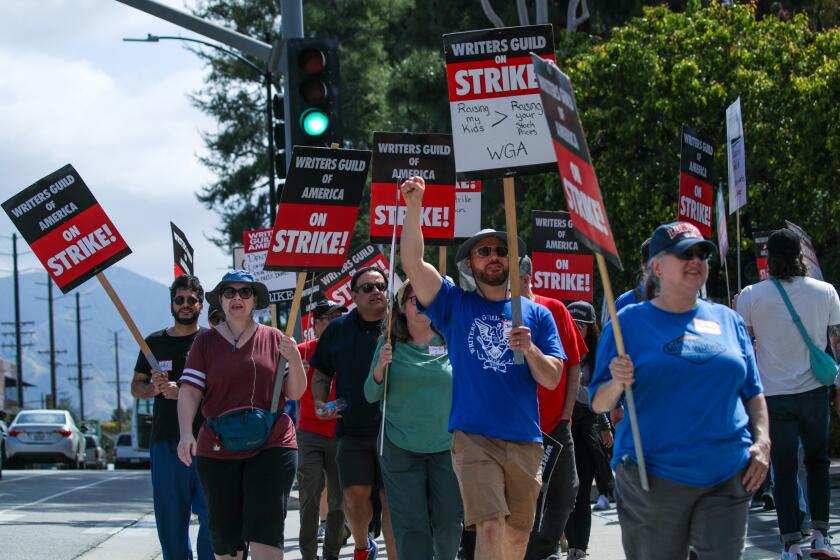Kaiser Permanente and unions reach tentative agreement one week after strike

Kaiser Permanente and a coalition of unions representing roughly a third of its workforce have reached a tentative contract agreement, a week after tens of thousands of workers walked off the job in protest.
The tentative deal, announced Friday morning on social media, was struck amid escalating pressure from the Coalition of Kaiser Permanente Unions, which represents more than 85,000 workers at Kaiser hospitals and clinics across the country.
Both Kaiser Permanente, which is based in Oakland, and SEIU United Healthcare Workers West, the biggest member of the coalition, said they were excited to have reached an agreement and thanked acting U.S. Labor Secretary Julie Su for her involvement.
“Su was instrumental in advancing talks and helping to facilitate a successful conclusion to these negotiations,” said Sarah Levesque, secretary-treasurer of OPEIU Local 2, another union in the coalition whose members include Kaiser optometrists and pharmacists.
Su praised the agreement Friday at a media briefing with Kaiser and union leaders.
“We saw healthcare workers put the country on their backs through a global pandemic and get us through,” and the agreement is a “historic example of what it means to truly value them,” Su said.
Unions representing striking workers said they were protesting ‘bad faith bargaining’ by Kaiser executives over solutions to staffing problems.
The tentative agreement includes a 21% increase in wages over four years, which labor leaders said would improve employee retention; phasing in a $25-per-hour minimum wage for coalition workers in California and a $23-per-hour minimum in other states; “protective terms” with regard to outsourcing; and initiatives to improve staffing issues, including streamlining hiring practices, according to statements released Friday by the coalition and by Kaiser.
SEIU-UHW President Dave Regan said the tentative deal “unquestionably allows this workforce to not just keep up with but exceed the cost of living that people are struggling with across the country.”
The planned raises will not differ from region to region, something that Regan described as “a hugely important principle to the coalition of unions.” Kaiser had previously proposed wage increases of differing sizes in different areas.
Kaiser‘s senior vice president of labor relations, Steve Shields, said that as wages rise, “it’s not our intention that this agreement would have any impact on rates” for Kaiser patients. He praised the deal as another step toward resolving staffing issues that matter to both workers and management.
As workers and management move forward, Shields said, “we have to really focus on mutual interests like creating the next generation of healthcare workers.”
Last week, more than 75,000 Kaiser employees went on strike in California, Oregon, Washington, Colorado, Virginia and Washington, D.C., in what labor leaders described as the biggest strike by healthcare workers in U.S. history. In most states, the strike lasted three days; in some areas it was a single day.
Among the wide range of workers who went on strike were licensed vocational nurses, X-ray technicians, surgical technicians, phlebotomists, medical assistants, pharmacy technicians and respiratory therapists, as well as support staff such as housekeepers and food service workers.
Workers said they were protesting “bad faith bargaining” by Kaiser executives as the unions negotiated over wages and other issues that labor leaders faulted for a chronic staffing crisis that strained employees and jeopardized patient care. Unions also said the raises Kaiser was previously offering wouldn’t keep up with the rising cost of living.
Kaiser leaders said they were trying to reach an agreement in good faith and argued that the organization had been working to address the effects of a national crunch on healthcare staffing, successfully hitting a target to hire 10,000 new employees represented by the coalition.
The recent run of wins in the Legislature for organized labor was remarkable. Now Gov. Newsom must decide if union-backed bills will become law.
Days after the initial strike ended, the unions warned that another, even bigger strike could be in the works from Nov. 1 to Nov. 8, after a union contract covering workers in the Seattle area expires.
The tentative deal, if ratified, is expected to avert that action, and Kaiser said the unions had withdrawn notices for the November strike. Workers plan to start voting on the new contract on Wednesday, the coalition said Friday. The agreement would last four years and be retroactive to Oct. 1.
“Millions of Americans are safer today because tens of thousands of dedicated healthcare workers fought for and won the critical resources they need and that patients need,” the coalition’s executive director, Caroline Lucas, said in a statement. “This historic agreement will set a higher standard for the healthcare industry nationwide.”
More to Read
Sign up for Essential California
The most important California stories and recommendations in your inbox every morning.
You may occasionally receive promotional content from the Los Angeles Times.













